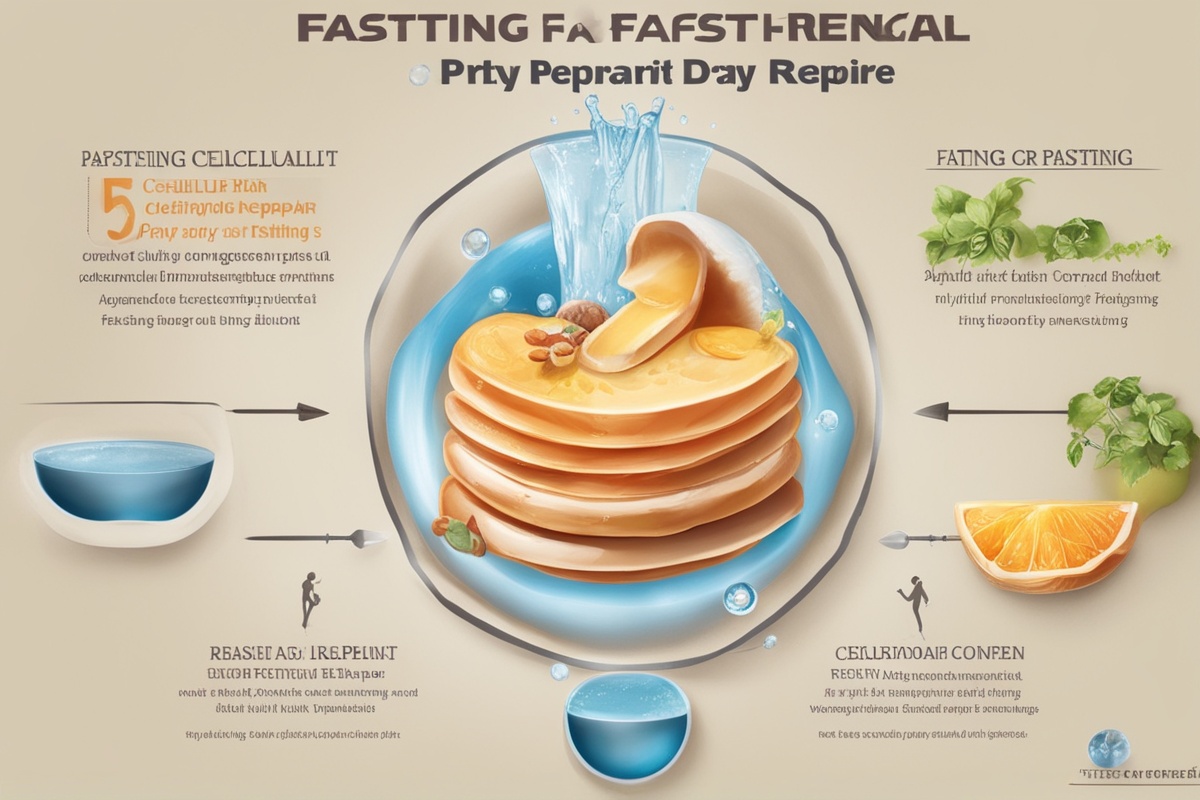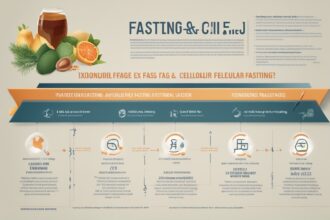Hey there, health enthusiasts! If you’ve been curious about the buzz surrounding fasting benefits, you’re in the right place. Fasting isn’t just a trendy diet hack; it’s a powerful tool that can transform your body at the cellular level. From ancient practices rooted in spiritual traditions to modern science-backed health strategies, fasting has emerged as a way to enhance longevity, improve metabolic health, and even protect against chronic diseases. In this deep dive, we’ll explore how fasting impacts cellular health, why it matters, and how you can harness these fasting benefits in your own life. Let’s unpack the science, sprinkle in some practical tips, and get you excited about what fasting can do for your body and mind!
What Is Fasting, and Why Does It Matter for Cellular Health?
Fasting, simply put, is the voluntary abstinence from food and sometimes drink for a specific period. Whether it’s intermittent fasting (like the 16:8 method), prolonged fasting (lasting 24–72 hours), or time-restricted eating, the goal is to give your body a break from constant digestion. But here’s where it gets fascinating: fasting triggers profound changes at the cellular level. When you fast, your body shifts from using glucose as its primary fuel to burning stored fats, producing ketones—a process called ketosis. This metabolic switch doesn’t just help with weight loss; it sets off a cascade of cellular repair mechanisms that are key to long-term health (Mattson et al., 2017). Think of fasting as a reset button for your cells, clearing out the junk and optimizing their function. Intrigued? Let’s dive deeper into the specific fasting benefits for your cells.
Fasting Benefits: Boosting Autophagy for Cellular Cleanup
One of the most exciting fasting benefits is its ability to enhance autophagy—a fancy term for your cells’ self-cleaning process. Autophagy, which literally means “self-eating,” is when your cells break down and recycle damaged proteins, organelles, and other cellular debris. This isn’t just housekeeping; it’s critical for preventing age-related decline and diseases like cancer and Alzheimer’s. Research shows that fasting, particularly prolonged or intermittent fasting, ramps up autophagy by stressing cells in a good way, forcing them to adapt and clean up (Levine & Kroemer, 2019). Without enough autophagy, cellular waste builds up, leading to inflammation and dysfunction. So, by incorporating fasting into your routine, you’re essentially giving your cells a spa day—refreshing and rejuvenating them from the inside out.
Want to maximize this benefit? Here are a few tips to get started:
- Start with a beginner-friendly fasting method, like 12:12 (12 hours of fasting, 12 hours of eating), to ease your body into the process.
- Aim for longer fasts (16–24 hours) once or twice a month to really kickstart autophagy—consult a healthcare provider if you’re new to this.
- Stay hydrated during fasting periods with water or herbal teas to support cellular processes.
- Avoid overeating during eating windows; focus on nutrient-dense foods to complement fasting’s cleansing effects.
Reducing Inflammation and Oxidative Stress Through Fasting
Chronic inflammation and oxidative stress are like silent saboteurs in your body, contributing to everything from heart disease to premature aging. Here’s where fasting benefits shine again. When you fast, your body reduces the production of pro-inflammatory markers and boosts antioxidant defenses. Studies suggest that intermittent fasting can lower levels of C-reactive protein (CRP), a key indicator of inflammation, and protect cells from oxidative damage caused by free radicals (Patterson & Sears, 2017). This is huge because less inflammation means less wear and tear on your cells, allowing them to function optimally. Whether you’re dealing with joint pain, fatigue, or just want to age gracefully, tapping into these anti-inflammatory fasting advantages could be a game-changer.
Fasting and Mitochondrial Health: Powering Up Your Cellular Engines
Let’s talk about mitochondria—those tiny powerhouses inside your cells that produce energy. When they’re not working well, you feel sluggish, and your risk for metabolic disorders spikes. Fasting benefits mitochondrial health by promoting a process called mitophagy, where damaged mitochondria are cleared out and replaced with healthier ones. This not only boosts energy production but also enhances your cells’ resilience to stress. Research indicates that fasting-induced ketosis plays a role in improving mitochondrial efficiency, which is why many people report feeling more focused and energized after adapting to a fasting lifestyle (Wallace et al., 2019). It’s like upgrading the engine in your car—everything runs smoother and faster.
Can Fasting Promote Longevity at the Cellular Level?
Here’s a question I get a lot: can fasting really help you live longer? While we can’t promise immortality, the science around fasting and longevity is promising. Fasting activates pathways like sirtuins—proteins linked to aging and DNA repair—that help protect cells from damage and slow the aging process. Studies on animals and early human trials suggest that caloric restriction and fasting mimicry can extend lifespan by reducing cellular senescence, or the accumulation of “zombie” cells that stop dividing but don’t die off (Longo & Mattson, 2014). By leveraging fasting benefits, you’re not just improving how you feel today; you’re potentially adding healthier years to your life. And who doesn’t want that?
If you’re curious about integrating fasting for longevity, consider these actionable steps:
- Experiment with time-restricted eating, such as eating only between noon and 8 p.m., to align with your body’s natural rhythms.
- Pair fasting with a diet rich in antioxidants (think berries, nuts, and leafy greens) to support cellular repair.
- Monitor how your body responds—keep a journal to track energy levels, mood, and any changes in health markers.
Practical Tips to Safely Reap Fasting Benefits for Cellular Health
Now that we’ve covered the science behind fasting benefits for cellular health, let’s talk about how to do it safely and sustainably. Fasting isn’t a one-size-fits-all approach, and jumping in without preparation can lead to fatigue, irritability, or worse. The key is to listen to your body and start slow. If you’re new to fasting, don’t attempt a 3-day water fast right off the bat. Instead, ease into it with shorter fasting windows and build up over time. Also, remember that fasting isn’t just about skipping meals—it’s about nourishing your body with quality food when you do eat. Focus on whole, unprocessed foods to support the cellular repair processes we’ve discussed. And always, if you have underlying health conditions like diabetes or are pregnant, consult a doctor before starting any fasting regimen (Harvard Medical School, 2020).
I’ve seen firsthand how fasting can transform energy levels and mental clarity, but it’s not without challenges. You might feel hungry or cranky at first—that’s normal! Stick with it, stay hydrated, and remind yourself why you’re doing this. The cellular health benefits of fasting, from enhanced autophagy to reduced inflammation, are worth the initial discomfort. Over time, your body adapts, and fasting becomes less of a chore and more of a lifestyle. So, why not give it a try and see how your cells thank you?
In wrapping up, fasting offers a remarkable array of benefits for cellular health, making it a powerful tool for anyone looking to optimize their well-being. From triggering autophagy and reducing inflammation to boosting mitochondrial function and potentially extending lifespan, the fasting benefits are hard to ignore. Backed by science and centuries of tradition, fasting isn’t just a passing trend—it’s a sustainable way to support your body at its most fundamental level. Whether you’re a beginner or a seasoned faster, there’s always room to explore new methods and refine your approach. So, take that first step, experiment with different fasting protocols, and unlock the incredible potential of your cells. Here’s to healthier, happier living—one fast at a time!
References
- Harvard Medical School. (2020). Intermittent fasting: The positive news continues. Harvard Health Publishing.
- Cell, 176(1-2), 11–42.
- Longo, V. D., & Mattson, M. P. (2014). Fasting: Molecular mechanisms and clinical applications. Cell Metabolism, 19(2), 181–192.
- Mattson, M. P., Longo, V. D., & Harvie, M. (2017). Impact of intermittent fasting on health and disease processes. Ageing Research Reviews, 39, 46–58.
- Patterson, R. E., & Sears, D. D. (2017). Metabolic effects of intermittent fasting. Annual Review of Nutrition, 37, 371–393.
- Wallace, D. C., Fan, W., & Procaccio, V. (2019). Mitochondrial energetics and therapeutics. Annual Review of Pathology, 5, 297–348.






